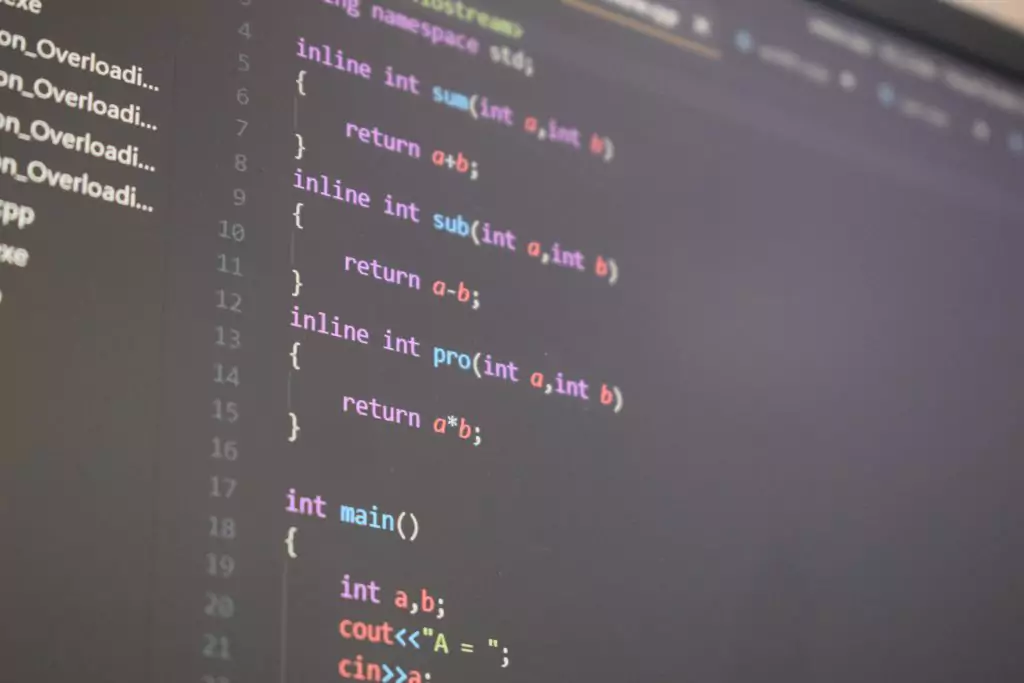If you’ve set your sights on learning a new programming language and need C++ academic assistance, a high-performance programming language widely used in game development, system software, and embedded firmware, you’ve landed in the right place. There’s a wealth of resources at your disposal, ranging from free tutorials to paid courses and even good old-fashioned books. Let’s navigate the C++ learning path together!

✅ AI Essay Writer ✅ AI Detector ✅ Plagchecker ✅ Paraphraser
✅ Summarizer ✅ Citation Generator
Key takeaways:
- There are a plethora of learning resources available for C++, including books, free and paid online courses, video tutorials, and coding bootcamps.
- It’s crucial to understand your learning style and set clear goals before choosing a resource.
- High-quality resources exist in both free and paid categories.
- No matter the resource you choose, mastering C++—like any skill—requires practice and consistent effort.
Overview of Different Types of Resources
Before delving into the list of specific resources, it’s crucial to understand the different types of materials available.
Firstly, there are books; some were even written by the pioneers of C++. They provide in-depth knowledge and often come with exercise sets to reinforce your understanding.
Secondly, we have online courses, which can be either free or paid. They often offer structured learning paths, including hands-on projects, and sometimes even provide certification upon completion.
Thirdly, there are video tutorials available on platforms like YouTube. They’re particularly useful for visual learners as they often involve step-by-step walkthroughs of coding exercises.
Finally, coding boot camps are immersive, intense programs designed to equip you with a specific skill set in a short period. They can be pricey but are often comprehensive.
Each type of resource has its pros and cons. Books offer in-depth, meticulous information but might feel overwhelming for beginners. Online courses and boot camps provide structured learning paths but may require a financial investment. Video tutorials can be helpful but lack the systematic learning approach that courses and books offer.
| Learning Method | Pros | Cons |
| Books | – Comprehensive, in-depth knowledge – Ideal for self-paced learning – One-time purchase | – May be overwhelming for beginners – Lack of interactive learning – No immediate feedback on exercises |
| Online Courses (Free) | – Self-paced learning – Includes interactive coding exercises – Free | – May not provide as in-depth knowledge as books – Quality may vary across courses – Generally lacks personal mentorship |
| Online Courses (Paid) | – Structured learning path – Often comes with a certification – Can offer personal mentorship | – Requires financial investment – Quality still varies across platforms – Time-limited access for some platforms |
| Video Tutorials | – Ideal for visual learners – Easy to follow along – Free | – May lack depth – No certification – Quality and pacing can greatly vary |
| Coding Bootcamps | – Intensive, immersive learning experience – Provides real-world projects – Offers career support | – Requires significant time and financial commitment – Pacing may be too fast for some learners – Not all bootcamps are created equal |
Free Resources for Learning C++

Starting your C++ journey doesn’t have to break the bank. Here are some top-notch free resources:
Codecademy: This online interactive platform offers free coding classes in 12 different programming languages, including C++. Codecademy’s C++ course consists of several lessons covering various topics, from basic syntax and variables to conditionals and loops. The interactive platform allows you to learn and practice simultaneously in an in-browser code editor.
LearnCPP: is a free website that offers comprehensive tutorials for C++. It has a neatly organized structure, starting from the basics like program structure and variable types and extending to complex topics like object-oriented programming, exception handling, and file I/O. The tutorial explanations are clear and easy to follow, making it an excellent place for beginners.
cppreference: is a comprehensive online encyclopedia for the C++ language. It contains detailed information on every part of the language and its standard library. While it’s not a traditional learning resource, it’s incredibly useful for looking up details, verifying information, and learning more about any specific topic in C++.
The Cherno on YouTube: The Cherno is a YouTube channel that offers a comprehensive series on C++. The videos are well-structured and explain complex concepts in an easy-to-understand manner. The content includes an overview of C++, coding principles, data structures, and more.
ProgrammingKnowledge on YouTube: ProgrammingKnowledge provides a vast array of tutorials covering various aspects of C++. The lessons are practical and focus on doing, making it an excellent resource for people who learn best by coding and problem-solving.
Make the most out of these free resources by practicing consistently. Remember, understanding programming isn’t about memorizing syntax but problem-solving and logical thinking.
Paid Resources for Learning C++
If you’re ready to invest financially in your learning journey, these resources offer comprehensive and structured paths:
‘Principles and Practice Using C++’ by Bjarne Stroustrup: This book is written by the creator of C++ himself. It is a comprehensive guide to programming principles and practice using C++. It covers a broad range of topics and includes a variety of exercises after each chapter to reinforce the concepts learned. The book is well-regarded for its in-depth coverage and practical approach.

‘C++ Primer’ by Stanley B. Lippman: This is one of the most popular books for learning C++. The book comprehensively introduces the C++ language, including its features, standard library, and key design techniques. It includes numerous examples and exercises, allowing readers to practice what they’ve learned.
Udemy: Udemy is an online learning platform that offers various C++ courses. These courses cater to various skill levels, from beginner to advanced, and are often taught by experienced professionals. The platform is known for its frequent sales, allowing learners to purchase courses at a significantly discounted rate.
Pluralsight: Pluralsight offers a plethora of online courses in C++, ranging from beginner to advanced levels. It also provides learning paths that offer a structured series of courses designed to take you from a beginner to proficient in C++.
Codecademy Pro: Codecademy Pro offers a more extensive range of resources compared to its free counterpart. This includes more comprehensive and advanced courses, quizzes, projects, and a certificate upon completion.
Hack Reactor’s C++ course: Hack Reactor is a coding boot camp known for its immersive software engineering programs. Their C++ course provides comprehensive and rigorous training, including real-world projects and support from experienced instructors.
Paid resources often offer more structure, personal support, and additional perks like certifications, which can add value to your resume.
Choosing the Best Resource Based on Learning Style and Goals
Everyone’s learning style is unique, and your chosen resources should reflect this. Visual learners prefer video tutorials, while those who learn by doing benefit more from interactive courses or boot camps. Books might be your go-to if you like learning through reading and self-exploration.
Did you know that: according to StackOverflow, 90% of developers say they are at least partially self-taught. Among current professional developers, 55.9% say they’ve taken an online course, and 53.4% say they’ve received on-the-job training.
Set clear, achievable goals. If you’re aiming for a career in game development, focus on resources that teach you C++ in that context. If system software or embedded firmware is your target, prioritize resources accordingly. Aligning your goals with your learning resources ensures that your learning journey remains relevant and interesting. Here are some practical tips and strategies to effectively navigate through the wealth of resources available, enhancing your learning experience and ensuring you make the most out of your C++ education.
| Understand Your Learning Style | Before you start, understand how you learn best. If you’re a visual learner, you might benefit from video tutorials. If you prefer learning by reading and self-exploration, consider starting with books. |
| Set Clear Goals | Defining what you want to achieve with C++ can help you stay focused and motivated. For example, if you’re interested in game development, choose resources that provide relevant exercises and projects. |
| Start with Basics | Begin with the fundamentals like syntax, variables, loops, and gradually move on to more advanced topics like object-oriented programming, data structures, and algorithms. Each concept builds on the previous one, so it’s essential to have a solid foundation. |
| Practice Consistently | The key to mastering programming is consistent practice. Write code every day, no matter how small or trivial it may seem. Coding is a practical skill, and the more you practice, the better you get. |
| Work on Projects | Once you’re comfortable with the basics, start working on small projects. This will help you understand how to apply the concepts you’ve learned in real-world scenarios. It also helps reinforce your learning and boosts confidence. |
| Read and Debug Code | Understanding and debugging other people’s code is a great way to improve your programming skills. It helps you learn new ways to solve problems and makes you a better programmer. |
| Use Online Communities | Websites like StackOverflow, GitHub, or C++ forums can be great resources when you’re stuck or have questions. You can learn a lot from other programmers’ experiences and solutions. |
| Stay Curious | Keep exploring new concepts, libraries, or tools related to C++. The field of programming is constantly evolving, and there’s always something new to learn. |
| Don’t Rush | Learning to code takes time. Don’t get discouraged if you do not understand a concept or your code is not working. Be patient with yourself, keep trying, and eventually, it will click. |
| Keep Updating Your Knowledge | Even after you’ve become proficient, there’s always more to learn in programming. Stay up-to-date with the latest practices, libraries, and updates in C++. |
Common Mistakes to Avoid When Learning C++
When learning C++, it’s important to be aware of common mistakes that beginners often make. Avoiding these errors can help you build a strong foundation in programming. Here are some key mistakes to avoid:

- Neglecting to plan: Jumping straight into coding without planning can lead to confusion and inefficiency. Take time to understand the problem, design a solution, and create a plan before writing any code.
- Ignoring syntax rules: C++ is a language with strict syntax rules. Failing to follow these rules can result in compilation errors. Pay attention to details like proper capitalization, semicolons at the end of statements, and matching parentheses.
- Not using comments: Comments are essential for code readability and understanding. Neglecting to add comments can make your code difficult to follow, especially when you revisit it later. Add comments to explain your code’s purpose, algorithms, and any important details.
- Skipping error checking: Error checking is crucial in C++ programming. Ignoring it can lead to unexpected program behavior or crashes. Always validate user input, check for potential errors, and handle exceptions appropriately.
- Overcomplicating code: Keeping your code simple and concise is important. Avoid unnecessary complexity, excessive use of loops or conditional statements, and convoluted logic. Writing clear and straightforward code improves readability and makes it easier to debug.
- Neglecting memory management: In C++, you have direct control over memory allocation and deallocation. Forgetting to release memory or mismanaging it can result in memory leaks or segmentation faults. Remember to deallocate dynamically allocated memory when it’s no longer needed.
By being mindful of these common mistakes, you can enhance your learning experience and become a more proficient C++ programmer. Practice consistently, seek help when needed, and strive for clean and efficient code.
Conclusion
Learning C++, like any new skill, requires practice and consistency. But with the wealth of resources available, you’re well-equipped to embark on this journey. Keep your goals clear, align them with your learning style, and most importantly, enjoy the process! The world of programming is vast and exciting, and mastering C++ is a significant step toward confidently navigating it.
Related stories:
What is C++? A Starter’s Guide To Powerful Language
Bachelors or Bootcamp – Choosing the Right Path for Aspiring Coders
Discover Python: The Perfect Starting Point for Coding Beginners
Follow us on Reddit for more insights and updates.
Comments (1)
Welcome to A*Help comments!
We’re all about debate and discussion at A*Help.
We value the diverse opinions of users, so you may find points of view that you don’t agree with. And that’s cool. However, there are certain things we’re not OK with: attempts to manipulate our data in any way, for example, or the posting of discriminative, offensive, hateful, or disparaging material.





I want to learn c++